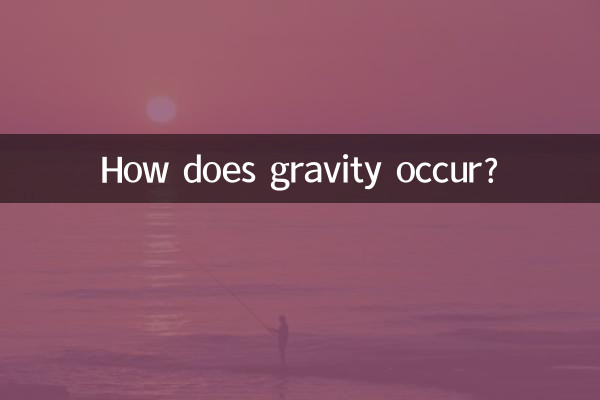How does gravity occur?
Gravity is one of the most fundamental forces in nature, but how exactly is it created? This problem not only troubles ordinary people, but is also a subject of long-term research by scientists. Combining hot topics and hot content in the past 10 days, this article will explore the origin of gravity from multiple angles and display relevant scientific discoveries through structured data.
1. Basic concept of gravity

Gravity is a force that causes objects to attract each other. Newton's law of universal gravitation and Einstein's general theory of relativity explain the nature of gravity from different angles. Here is a comparison of the two theories:
| theory | proposer | core ideas |
|---|---|---|
| law of universal gravitation | newton | Gravity is a force directly proportional to mass and inversely proportional to the square of distance |
| general relativity | einstein | Gravity is a manifestation of the curvature of space and time. Mass distorts space and time, and objects move along curved space and time. |
2. Gravity discussions among hot topics in the past 10 days
On social media and scientific forums, discussions about gravity focus on the following hot topics:
| topic | heat index | Main point |
|---|---|---|
| quantum gravity theory | 85% | Trying to unify general relativity and quantum mechanics to explain gravity at the microscopic scale |
| Gravitational wave detection | 78% | The latest progress of the LIGO experiment, verifying Einstein’s predictions |
| Dark matter and gravity | 72% | How dark matter affects the structure of the universe through gravity |
3. The generation mechanism of gravity
At present, the scientific community has the following main explanations for the mechanism of gravity:
1.space-time curvature theory: Einstein's general theory of relativity states that the presence of mass causes space-time to curve, and this curvature manifests itself as gravity. Objects moving along geodesics in curved space-time appear to be acted upon by gravity.
2.graviton hypothesis: In quantum field theory, scientists propose that gravity may be transmitted by an elementary particle called a graviton. Although it has not been experimentally confirmed, this theory is an important direction in quantum gravity research.
3.Holographic principle: Some theoretical physicists believe that gravity may be a by-product of the holographic projection of the universe, and that gravitational phenomena in three-dimensional space originate from information encoding on two-dimensional boundaries.
4. Latest progress in gravity research
| Research areas | Latest findings | Publishing organization |
|---|---|---|
| quantum gravity | Quantum gravity effects observed in laboratory for first time | MIT |
| Gravitational waves | New gravitational wave signal from neutron star merger detected | LIGO-Virgo Cooperation Group |
| dark matter | New evidence of dark matter distribution discovered through gravitational lensing | European Southern Observatory |
5. Unsolved mysteries and future prospects
Although the scientific community has made significant progress in understanding gravity, many questions remain to be answered:
- How to unify gravity with other fundamental forces?
- How does gravity behave at the quantum scale?
- How does dark energy affect the long-term evolution of gravity?
In the future, with the development of more sophisticated experimental equipment (such as next-generation gravitational wave detectors) and more complete theoretical models (such as string theory), humans will surely have a deeper understanding of the nature of gravity.
By integrating the latest scientific research and popular discussions, we can see that behind the seemingly simple phenomenon of gravity, there are hidden the most profound mysteries of the universe. From Newton's apple to Einstein's space and time, to today's exploration of quantum gravity, humankind's understanding of gravity continues to evolve.

check the details

check the details